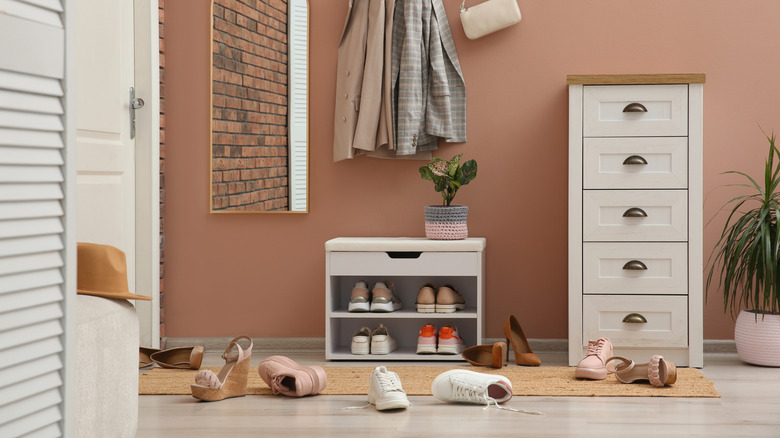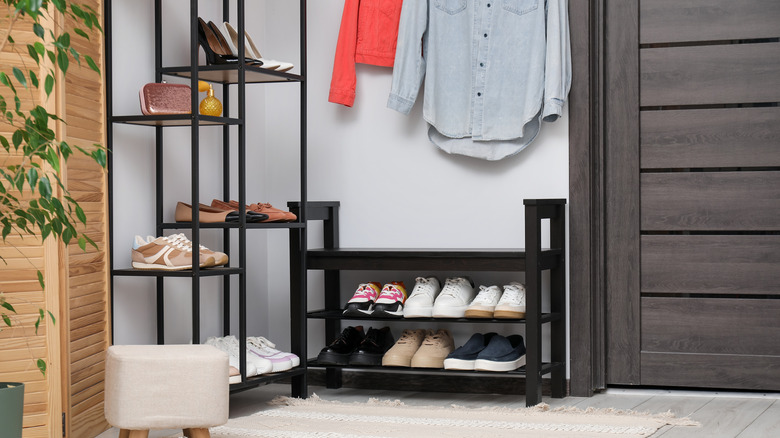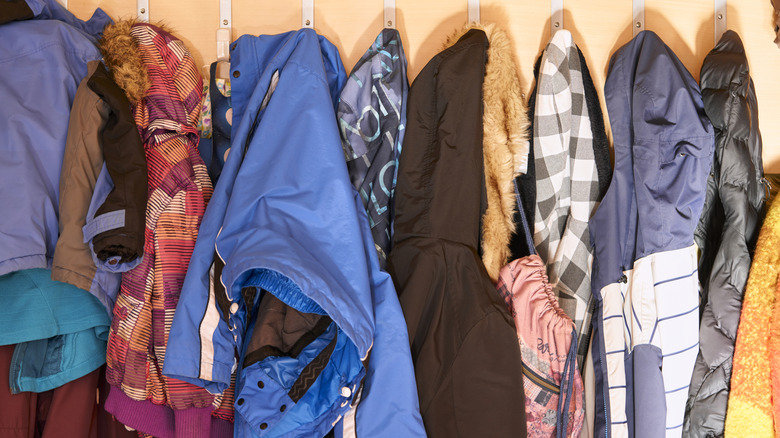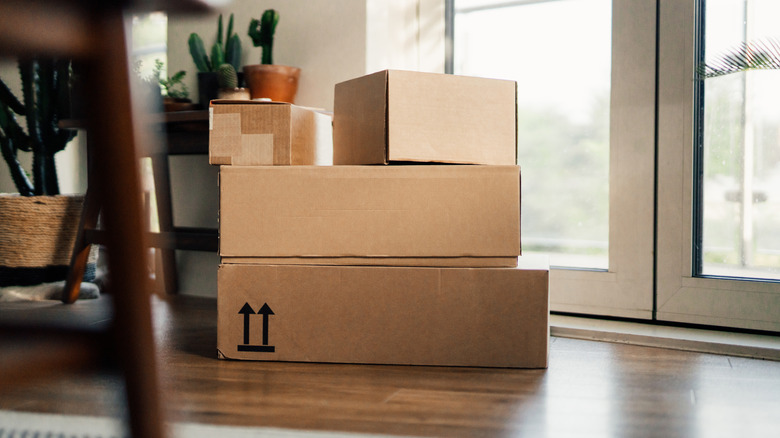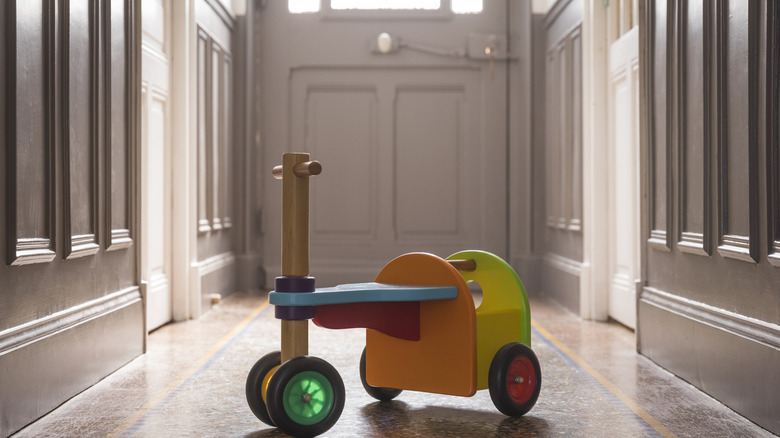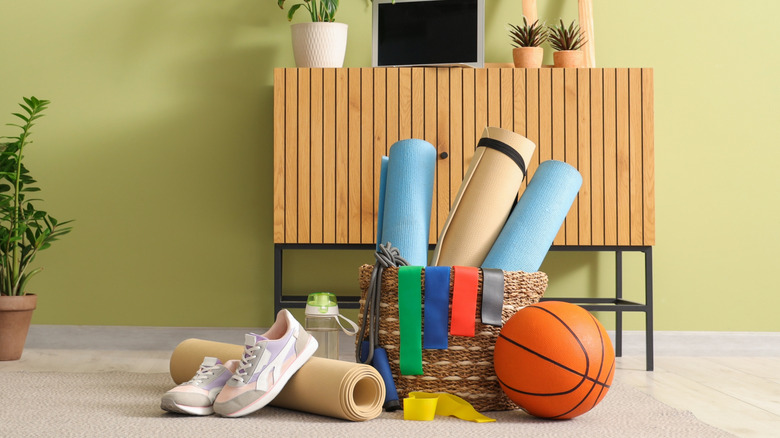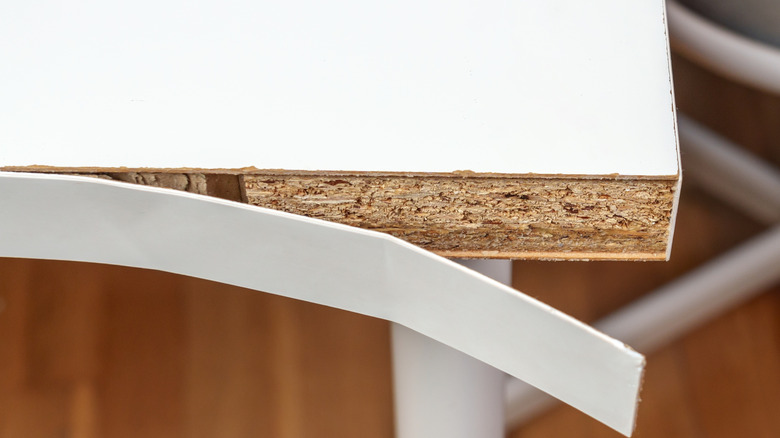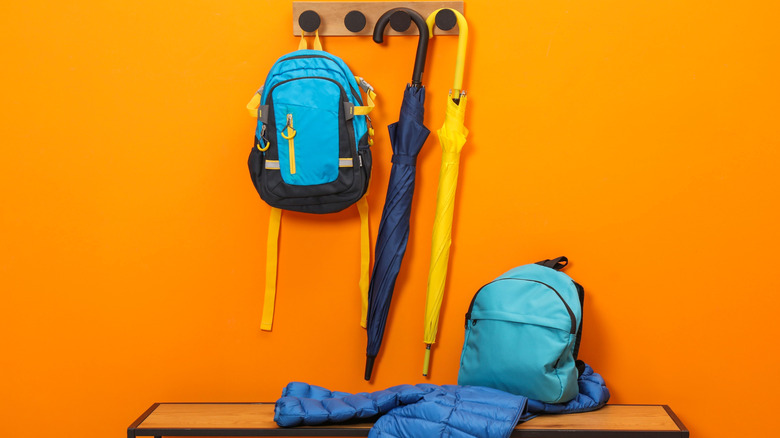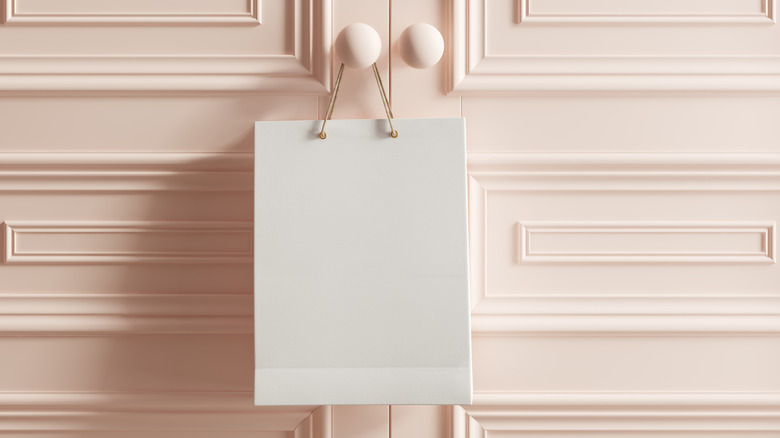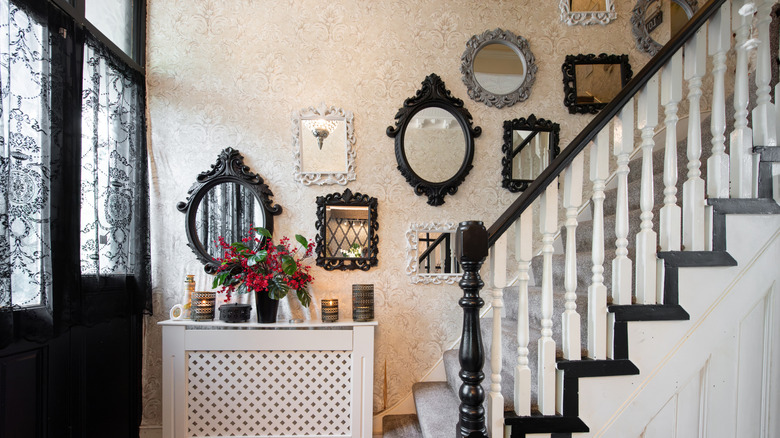Things That You Can Stop Storing In Your Home's Entryway
Your home's entryway is the first thing anyone sees when they walk in. Whether you're simply trying to make your entryway more functional or wish to fake the look of a formal foyer, there is one thing that can stand in the way. It can feel overly cluttered when storing too many items in it. Because we enter and leave our homes from these rooms, they can become a dumping ground for items that really don't belong. If left unaddressed, the clutter can multiply over time, and before you know it, you'll hardly be able to walk without stumbling on something that doesn't belong.
Thankfully, it doesn't have to be this way. When you take some time to really assess what does (and doesn't) deserve to take up space in your entryway, you can reclaim the space. This ensures that it's functioning in the manner that best serves you and the others in your home. So, here are some items that you should stop storing in your entryway to prevent it from becoming cluttered and dysfunctional.
Don't let mail pile up in the entryway
Be honest, has your foyer turned into a dumping ground for mail? We get it. You grab the mail on your way in after work, and that entryway table is a convenient spot to drop it and move on to everything else you need to do. However, it doesn't take long for the surface to become overrun with bills, magazines, and sales flyers. This can give your entryway a very cluttered look. Beyond creating an eyesore, mail doesn't belong here. If you have important bills or other sensitive documents, you don't need them hanging out right by the front door, possibly in sight of anyone who walks up to your home.
Instead, you can help prevent clutter from accumulating in your home by taking a few minutes to go through the mail each evening. Get rid of junk mail, magazines that you know you won't read, or credit card offers you're not interested in. Many of these pieces should be recyclable, but you may want to shred anything with your personal information in order to protect your identity. After sorting through the mail, designate a spot (that's not in your entryway) for any letters or documents that you want to keep. Ideally, this would be somewhere more secure and appropriate, such as a home office or a dedicated drawer in your bedroom. Prevent these areas from getting filled with documents by regularly shredding things you no longer need, such as bills that have been paid or outdated forms. You could also sign up for electronic billing with your credit card and utility companies to stop physical copies from arriving at your home in the first place.
Your entire shoe collection does not belong in the entryway
Yes, the entryway is a very convenient place to keep shoes. Doing so gives you a spot to slip them off so you don't track dirt and germs across the floors. However, while keeping a few pairs in the foyer is a good idea, using the area to store your entire collection is not the way to utilize it. You don't need to keep your go-to flip-flops in the entryway during the dead of winter, just as those snow boots don't belong there during the summer months. Similarly, those sneakers you never wear anymore since you've purchased a new pair shouldn't be housed right inside your front door. Leaving an excessive number of shoes (especially for multiple members of your household) is only going to make the area look cluttered and decrease its functionality.
So, take time to sort through all the pairs of shoes that you currently have in the foyer. Pick two to three pairs that you regularly wear, and find a new location for the rest. A bedroom closet or in an under-the-bed box, such as the Onlyeasty Under Bed Shoe Storage Organizer, are two great locations to consider. There are also several affordable IKEA finds that are perfect for shoe storage, such as the SKOSTALL shoe organizers, which cut the footprint that each pair consumes in half.
Remove off-season outerwear
If you have any off-season outerwear in your entryway, now is the time to find a new home for it as well. The heavy coats, winter hats, and gloves won't be used during the summer. Similarly, your lightweight jackets and bucket hats aren't likely to see the light of day during the frigid winter. These items will consume useful space that could be used to hold items that you actually need at the time. Or, the area can simply be left empty for a less cluttered and more minimalist look.
While you don't want to let your outerwear consume space in your foyer, you also don't want to risk damaging it. Therefore, proper storage is important, particularly for your heavy winter coats. While it may be tempting to put these items in a vacuum bag and suck out the air for more compact storage, doing so isn't a good idea. The filling in your down jackets may become too compressed and never fully rebound next season when you remove them. Instead, hang your coats in a garment bag, such as the Whitmore Deluxe Zippered Suit Bag. To keep moths from causing damage, throw in a few cedar wood balls (like the EcoKiwi Cedar Balls). Don't forget to choose a hanger with wider ends to help protect the shape of the coat's shoulders.
Packages piling up can make the entryway look cluttered
When you have a package delivered that you don't have an immediate need to open, where does it end up? If you're like many, you likely think, "in the foyer." It's so convenient to let packages pile up right inside the door. This is especially true around times like the holidays, when the number of packages can get even more out of control. All of these boxes and padded envelopes don't belong here and only make your home look cluttered, messy, and uninviting to guests as soon as they walk in. Large boxes can also negatively impact the functionality of the space by blocking access to the closet or creating a tripping hazard.
Ideally, you should unpack your deliveries when they arrive, eliminating the need to keep the boxes anywhere in your house. However, if that simply isn't feasible due to time, keeping the contents hidden from a family member, or some other reason, look for an alternative location to store the box until you're ready to unpack it. This may be in a garage, a corner of the laundry room, or even the basement — just not in the entryway.
Find a new home for children's toys
Preventing your home from getting overrun by kids' toys can be a challenge. These toys seem to have some magical powers that cause them to spread into every room, including the foyer. However, this isn't a good location to let them accumulate. Beyond the cluttered look it can create, small toys can be a tripping hazard in this relatively tight area that people pass through regularly. Additionally, the dirt that gets tracked in on everyone's feet could transfer to the toys. If you have young children, you know how everything always winds up in their mouths, and you don't want to increase the likelihood that they'll ingest something that could make them sick.
So, instead of letting toys accumulate in the entryway, set the expectation with your children that they remain in their bedroom, the playroom, or whichever other room you deem appropriate. Developing this habit of keeping the toys in a set location will likely take time and support from you. You could even develop a routine where your children spend 5 to 10 minutes each evening removing toys from the foyer and returning them to the appropriate bin or shelf.
Find an alternative storage location for sports gear and equipment
You know what else has a tendency to start consuming an entryway? Sports gear and equipment like that yoga mat you'll need for tomorrow's class or the muddy soccer cleats from last weekend's game. Sound familiar? Whether it's you or your children (or everyone in the household) who is active in sports, the entryway doesn't need to house all of the gear or equipment.
If you have a garage, it will likely be the best place to keep these items. Otherwise, a basement, laundry room, or shed would also be more appropriate. Sure, keeping the items in the entryway is convenient. They're right there when you're ready to walk out the door to a practice or game. However, it also makes the room look messy and can allow more dirt and debris to accumulate in it as well.
Any broken or unusable furniture and accessories need to go
There are plenty of items that belong in the entryway, including an umbrella for rainy days, your dog's leash, or a jacket for chilly mornings. However, these items only deserve to remain in the space as long as they are still regularly being used and are in usable condition. So, if one of your umbrellas breaks or you've purchased a new dog leash to replace one that was fraying, remove the old ones from the entryway immediately. Keeping these items in the foyer will serve no functional purpose since they are not in good condition. They'll only clutter the room and make it tighter to move around in. This rule goes for any broken furniture pieces, too. Don't keep a bench that no one can actually sit in or a shoe rack that has started falling apart.
In most cases, the unusable items from your entryway belong in the trash (or possibly the recycling bin). If they're something that you think you'll be able to repair yourself or plan to bring to a professional to fix, then you should either do so immediately or give yourself a set deadline for completion. However, still relocate them to the garage, basement, or another location while awaiting these repairs.
Lunchboxes, backpacks, and work bags don't need to permanently reside in the entryway
If you or your children go to work and school every day, the foyer can turn into the backpack (or briefcase/work bag) storage zone. You come into the house at the end of a long day, hang the bag up (or toss it in a corner), and grab it the next morning as you head out the door. However, these bags (as well as lunchboxes or other accompaniments) shouldn't be stored in the foyer. While it may be convenient, they're so bulky that they can overwhelm the space and throw off the aesthetics.
Instead, consider keeping these bags in a mudroom, laundry room, or home office. It will require a slight adjustment to everyone's morning and afternoon routine to get them from or return them to their new home, but the space you reclaim will be well worth it. If you've been storing them in the entryway because of the simplicity of hanging them on one of the coat hooks, you can easily add a hook to their new home as well. Look for something like the Bussdis Coat Hooks or even the Command X-Large Hooks if you rent your home or don't want to leave holes in the wall.
Don't let items that are waiting to go to the car accumulate
Do you tend to use your entryway as a staging ground? You unpack the reusable bags from the grocery store and put them next to the front door to bring back to the car later. Or maybe you try on the sweater that you ordered, realize it doesn't fit, and put the bag on the console table to return it when you have time. Putting an end to this practice can go a long way in keeping your foyer from constantly looking overrun and messy. Even with the best of intentions, those reusable bags may sit by the door for a few days before they find their way back into the car. And, with your busy schedule, it might take you weeks or more to take care of those in-store returns.
Finding a new location for these items is much better than leaving them in your entryway, where they're one of the first things people see when they come into your home. Even more ideal, however, would be taking the time to immediately address what you can. For example, after you unpack your groceries, slip on a pair of shoes, and return the reusable bags to your car right away. Look at your schedule for the following day and see if you can squeeze in dropping off that return. If so, bring it out to the car immediately as well. Checking an item off your to-do list and clearing that mental clutter can feel as good as removing the physical stuff from the entryway.
Too much decor can make the space feel cramped or cluttered
We get it. You want to bring a smile to your face (and properly welcome guests) upon entering your home. Adding some artwork and other decorations can certainly help achieve this goal. However, overdoing it with too many pieces can actually have the opposite effect. Instead of creating that warm environment that you desire, you may inadvertently make the space feel chaotic and overwhelming. There are a few signs that can indicate that you've overdecorated a room. These include things that lead to visual clutter, like a large number of decorative items on your console table or too many pieces of art on the walls. Too many different colors competing for attention, or just that feeling that the space is "too much," are other indicators.
So, be very purposeful with your design choices, and be careful to avoid overdoing things. You can actually make a small entryway feel bigger with fewer elements than you may think. For example, hanging a large mirror, like the Harritpure Round Mirror, on the wall will reflect light and trick the eye into thinking that the space is bigger than it really is. As for wall art, one larger canvas can also make the space feel bigger and less cluttered than several smaller paintings.
As a general rule, consider a less-is-more approach when choosing decor pieces for your foyer. Opt for more decorative functional items (like a bench or chair), and add just a few accents to the walls or console table. Having some blank space will not only help you avoid too much visual clutter, but it will also allow visitors to focus on the items that you've carefully selected.
